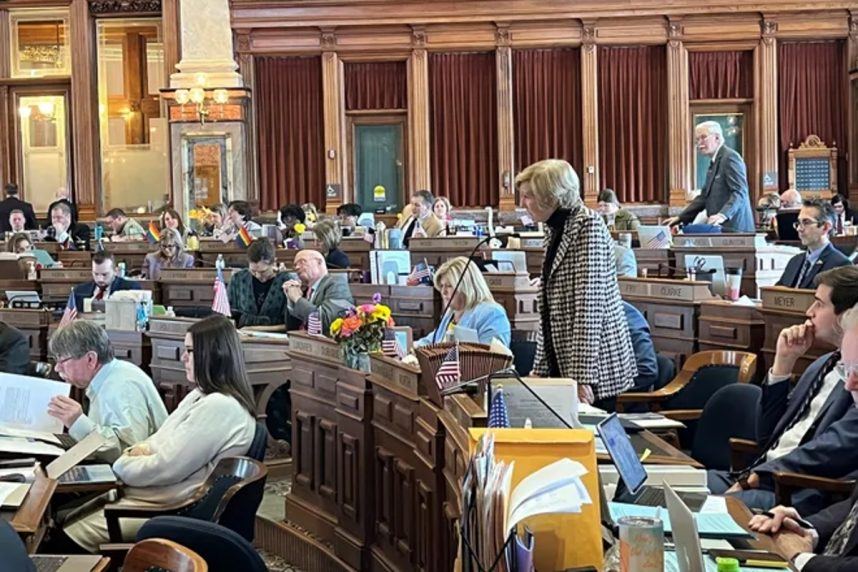Iowa Casinos May Receive Tax Break as Nebraska Competitors Emerge
Posted on: February 26, 2024, 05:21h.
Last updated on: February 27, 2024, 12:25h.
Iowa casinos could see their effective gaming tax lowered in the coming years if new legislation finds favor in the Des Moines capital.

Iowa is home to 15 land-based commercial casinos, three riverboats, and one racino. The 19 casinos offer slot machines, table games, and sports betting.
Gross revenue from slots and table games is subject to a graduated tax. Most fall under the highest rate of 22%, which applies to any casino that generates at least $3 million in GGR in a given year.
Iowa Representative Jane Bloomingdale (R-Worth) thinks with casinos opening in neighboring Nebraska, the state would be smart to encourage its gaming licensees to make capital investments. That would keep the Hawkeye State’s gaming industry competitive.
“We’re lowering taxes for individuals, we’re lowering taxes for corporations, but we’re not lowering taxes for casinos. It just doesn’t seem fair,” Bloomingdale said.
Bloomingdale introduced House Study Bill 719 last week. The measure, if passed in the legislature and signed by Gov. Kim Reynolds (R), would reduce the commercial gaming tax on slots and table income over three years.
The study bill already passed a House Ways and Means subcommittee, which means the measure will soon gain a House File number and receive consideration from the full committee.
Nebraska Gaming Begins
Aside from 2020, Iowa’s commercial gaming industry has grown each year since 2014. GGR has risen from $1.39 billion in 2014 to $1.94 billion last year.
However, when sports betting revenue was excluded, legacy gaming — in-person slots and tables — was down 1.2% year-over-year in 2023.
Nebraska is presumably the culprit, as temporary casinos opened in the Cornhusker State. Iowa casinos in Council Bluffs suffered the most, as Nebraskans now have gaming options without needing to travel across the Missouri River.
Mark Joyce, a lobbyist who represents the interests of the Diamond Jo casinos in Northwood and Dubuque, told Radio Iowa that a tax break could help Iowa casinos make renovations and amenity updates to compete with the new casinos in Nebraska.
It’s a very mature industry in Iowa and the newer casinos … in Nebraska are going to be brand new,” Joyce said. “They’re going to be taxed at 20% so for us to be able to have extra capital to put back in the properties and better compete for your business [would be good].”
Five permanent casinos in Nebraska are amid construction in Omaha, Lincoln, Columbus, Grand Island, and Hastings.
Bill Specifics
Bloomingdale’s casino bill proposes reducing the casino slot and table tax to 21% beginning July 1, 2024. The tax rate would decline to 20% on July 1, 2025, and down to 19% effective July 1, 2026. The 19% tax would remain in perpetuity.
The tax reduction applies to land-based and riverboat casinos. The racino facility would be taxed slightly higher — 2% more than the rates for the casinos each year.
Iowa’s casinos have a strong lobbying presence in Des Moines.
In June 2022, the industry successfully thwarted further competition by having the legislature and Reynolds approve legislation that prevented the Iowa Racing and Gaming Commission from issuing new casino licenses for two years.
The moratorium is set to lift on July 1.
Related News Articles
Nebraska Casinos Win $89M in First Full Year, Do Nearly $18M in Taxes
Nevada Casinos Post Best October Ever, Win $1.3B From Gamblers
Nebraska Casinos Poaching Play From Iowa, Gaming Revenue Reports Suggest
Louisiana Casinos End Nine-Month Revenue Slide, Win $185M in November
Most Popular
Mega Millions Reportedly Mulling Substantial Ticket Price Increase
NoMad Hotel to Check Out of Park MGM on Las Vegas Strip
VEGAS MYTHS BUSTED: To ‘86’ Someone Was Vegas Mob Slang for Murder
Most Commented
-
End of the Line for Las Vegas Monorail
— April 5, 2024 — 90 Comments -
Mega Millions Reportedly Mulling Substantial Ticket Price Increase
— April 16, 2024 — 8 Comments -
Long Island Casino Opponents Love New York Licensing Delays
— March 27, 2024 — 5 Comments
















No comments yet